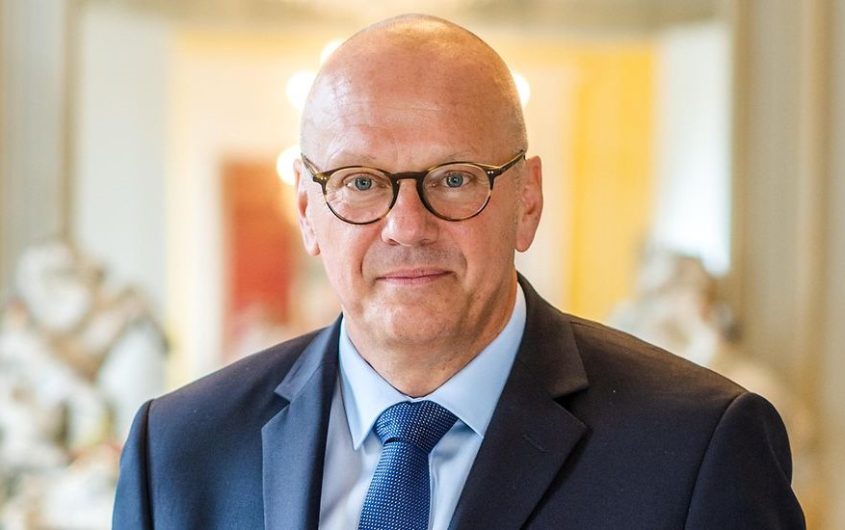
AGI Profiles: Andreas Michaelis

John Michaud
AGI/Halle Foundation Intern
John L. Michaud is a research intern at AGI for the spring of 2022. He provides writing and research support to AGI's programs, monitors the media, documents meetings and events, and assists with database management.
Mr. Michaud is pursuing an MA in International Affairs at American University, with a focus on U.S. foreign policy and transatlantic relations. He has completed coursework on topics including U.S. security strategy, foreign policy institutions, and nationalism. In the summer of 2023, he will spend a semester at Freie Universität Berlin, where he hopes to solidify his German language skills and gain a better understanding of German and European perspectives on security policy.
Mr. Michaud graduated from the University of Virginia with a BA in Foreign Affairs and minor in German. As an undergraduate, he spent a semester studying the European Union in Freiburg, Germany. Prior to graduate school, he worked at National Journal, where he led a research team dedicated to profiling top policymakers in Washington and beyond. He grew up just outside of the Beltway in Fairfax County, Virginia.
State Secretary, Federal Foreign Office
Andreas Michaelis currently serves as a state secretary in the German Federal Foreign Office, a position he has held since January 2022. Over the course of four decades at the Foreign Office, he has served as ambassador to three countries, most recently the United Kingdom, and twice in the highest-ranking civil service post (state secretary). In December 2022, German media reported that Michaelis would take over as ambassador to the United States this summer after Emily Haber leaves her post.
Career
Born in Hannover in 1959, Michaelis studied at Oxford’s Keble College (where he is an honorary fellow) before joining the Foreign Office in 1989. After completing his training and serving as a private secretary to the minister of state, Michaelis took his first post abroad at the German Embassy in Tel Aviv in 1992. It was there that he got to know Joschka Fischer, a prominent figure within the Green Party who would later serve as foreign minister under Chancellor Gerhard Schröder. In 1998, Fischer chose Michaelis—one of the few diplomats at the time who supported the Green Party—as the deputy spokesperson for the Foreign Office and in 1999 promoted him to spokesperson. In 2002, he was appointed ambassador to Singapore.
Returning to the Foreign Office’s Berlin headquarters (Das Haus am Werderschen Markt) in 2006, Michaelis continued to focus on Asia as the Director-General for Asia and the Pacific. In 2007, he moved to the same role for the Near and Middle East and the Maghreb. In 2011, Michaelis was appointed ambassador to Israel, one of the most sensitive positions in German diplomacy. In the words of former Süddeutsche Zeitung editor Kurt Kister, the promotion demonstrated that Michaelis had the “full trust” of the most important decisionmakers in the Foreign Office and the Chancellery. After four years in Tel Aviv, he took over as political director in the foreign office, a position close to the foreign minister with significant influence over foreign policy. As the fourth Merkel government took office in 2018, Foreign Minister Heiko Maas (SPD) appointed him state secretary, the highest-ranking civil service position in the Foreign Office.
In 2020, Michaelis took on another significant and sensitive role: German ambassador to the UK. At the time, the UK was negotiating the terms of its exit from the European Union—an often-contentious process—while struggling with COVID-19 and domestic political turbulence. While he criticized some of the UK government’s actions during the negotiations, Michaelis also sought to strengthen bilateral relations where possible. The Guardian credited him as a driving force behind a UK-Germany joint declaration on security policy that established an annual high-level Strategic Dialogue, announced in June 2021.
When the Ampelkoalition (traffic light coalition) took power at the end of 2021, Annalena Baerbock—the first Green Party foreign minister since Fischer—chose Michaelis to return to his prior position as state secretary. Per Der Spiegel, Baerbock trusted Michealis more than incumbent Miguel Berger to carry out the “values-based” foreign policy favored by the Greens (Berger wound up as ambassador in London, effectively swapping jobs with Michaelis). In this role, Michealis’ portfolio includes the Political, Europe, and Asia and Pacific Sections of the Foreign Office, as well as the Crisis Reaction Center. In December, German media reported that Michaelis would assume the role of ambassador to the United States by the summer, when current Ambassador Emily Haber leaves her post. Per Tagesspiegel, Baerbock played a decisive role in Michaelis’ appointment over FDP Vice-chair Alexander Lambsdorff.
How might he approach his role as ambassador?
In public comments, Michaelis has spoken in favor of a stronger Europe that both pulls its weight in the transatlantic alliance and hold its own as a global actor. Speaking at the Aspen Institute Berlin in 2018, he stated that Germany “must invest in our strengths and fulfill our commitments” to be a better partner to the United States and “boost the EU’s capability to act.” In a 2019 interview with Tagesspiegel, Michaelis identified the “future of Europe” as the most important issue facing the Foreign Office. He added that Germany’s role would be to lead and strengthen Europe as a “sovereign actor” on the world stage.
In an article on the Ampelkoalition’s decision to send Michaelis to Washington (and Lambsdorff to Moscow), Tagesspiegel reported that Baerbock considered Lambsdorff an “old school” transatlanticist who would not sufficiently emphasize “German and European autonomy” from the United States on key policy matters, including China. This implies that Baerbock trusts Michaelis preserve this autonomy and communicate differences to Washington when necessary. The report added that Baerbock believed Michaelis would be able to form a “unified German line” between herself and Chancellor Scholz, who both maintain close relationships with their American counterparts.
What have others said about him?
Over his decades in public service, media profiles have characterized Michaelis as smart, ambitious, and confident. In a 1999 Tageszeitung profile, colleagues called him determined, career-oriented, and well-mannered. An opposition politician once praised Michaelis as “the smartest that we have in the foreign office.” After Baerbock brought Michaelis back to the Haus am Werderschen Markt as state secretary, Der Spiegel described him as a “foreign policy strategist and adept negotiator,” as well as “uncommonly confident.”








